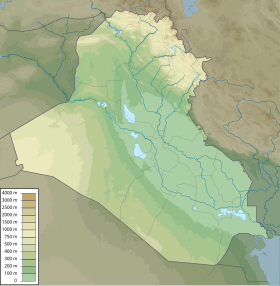Our website is made possible by displaying online advertisements to our visitors.
Please consider supporting us by disabling your ad blocker.
Battle of Khazir
| Battle of Khazir | |||||||
|---|---|---|---|---|---|---|---|
| Part of the Second Muslim Civil War | |||||||
| |||||||
| Belligerents | |||||||
| Umayyad Caliphate | Pro-Alid forces of Mukhtar al-Thaqafi | ||||||
| Commanders and leaders | |||||||
|
Ubayd Allah ibn Ziyad † Husayn ibn Numayr al-Sakuni † Humayd ibn Hurayth al-Kalbi Umayr ibn al-Hubab al-Sulami (defected) Shurahbil ibn Dhi'l Kala' al-Himyari † Rabi'a ibn al-Mukhariq al-Ghanawi † |
Ibrahim ibn al-Ashtar Tufayl ibn Laqit Sufyan ibn Yazid al-Azdi Ali ibn Malik al-Jushami † Abd al-Rahman ibn Abd Allah al-Nakha'i | ||||||
| Strength | |||||||
| ~60,000 | 13,000 or ~20,000 | ||||||
| Casualties and losses | |||||||
| Heavy | Heavy | ||||||
Location within modern Iraq | |||||||
The Battle of Khazir (Arabic: يوم الخازر, romanized: Yawm Khāzir) took place in August 686 near the Khazir River in Mosul's eastern environs, in modern-day Iraq. The battle occurred during the Second Muslim Civil War and was part of the larger struggle for control of Iraq between the Syria-based Umayyad Caliphate, the Kufa-based pro-Alid forces of Mukhtar al-Thaqafi, and the Mecca-based caliphate of Abd Allah ibn al-Zubayr. It ended in a rout for the Umayyads and the expansion of Mukhtar's rule into the region of Mosul.
The Muslim civil war left the Umayyad realm restricted to Damascus and its environs after most of their territories came under Ibn al-Zubayr's orbit. However, an Umayyad resurgence began with the accession of Caliph Marwan I, who dispatched an army led by Ubayd Allah ibn Ziyad to reconquer Iraq. This army's advance into Mosul precipitated the Battle of Khazir and its commander, Ubayd Allah, was an enemy of Mukhtar's pro-Alid partisans. Thus, Mukhtar quickly moved to halt the Umayyad advance, sending his Persian mawālī-dominated forces led by Ibrahim ibn al-Ashtar to confront the predominantly Syrian Arab army of the Umayyads. During the initial combat, part of Ibn al-Ashtar's forces were put to flight, but then regrouped under his command and charged against the Umayyad center. This resulted in heavy casualties on both sides and Ubayd Allah and several of his lieutenants were slain. The Umayyad commander Umayr ibn al-Hubab and his Sulaymi tribesmen deserted while the pro-Alids pursued the remaining Umayyad troops, scores of whom drowned in the Khazir River.
Khazir was a major setback for the Umayyads, who did not launch another invasion of Iraq until 691. However, Mukhtar's victory was short-lived as he was killed a year later when the Zubayrids took over Kufa. Meanwhile, the blood feud between the Qaysi and Yamani tribal elements of the Umayyad Caliphate intensified due to Umayr's mid-battle defection and subsequent spearheading of attacks against the tribes of Taghlib and Kalb. In these later battles, the Kalb were led by Humayd ibn Hurayth al-Kalbi, an Umayyad commander who survived Khazir.
Previous Page Next Page



